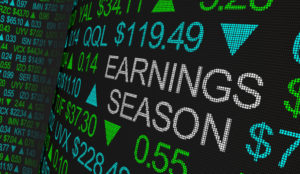At the Financial Times, Michael Mackenzie suggests that earnings season could put an end to the current stock market strength. He writes:
Global and US economic data are beating forecasts and there is growing optimism that corporate profits will do likewise, as the second-quarter earnings season plays out in coming weeks.
One strong theme supporting equity markets since the worst of the pandemic panic in March is that the shock to companies’ profits will be brief. Before long, the thinking goes, growth in net income will resume its upwards trend.
Granted, that rebound is expected to take a couple of quarters. Analysts anticipate a decline of 21.5 per cent in earnings of the S&P 500 companies during the current calendar year, according to FactSet, accompanied by a slide of 3.9 per cent in revenues. But next year, profits are expected to grow by 28.2 per cent, with revenues rising 8.5 per cent. That is quite a reversal, even by the perennially optimistic standards of most analysts on Wall Street.
Still, there are plenty of market watchers who think such a sunny outlook ignores the high likelihood of a slow and drawn-out economic recovery. And that is before the recent surge in new Covid-19 cases in a number of countries, which heightens the challenge facing many companies and their bottom lines.
The global equity strategy team at Citi, led by Robert Buckland, say stocks around the world may well be stuck over the next 12 months. They recommend waiting for the next dip in prices, rather than “chasing markets higher” from current levels.
Their rationale is that analysts’ forecasts for next year’s profits are about 30 per cent too high. And if that is true, the MSCI World index that tracks developed markets is trading at 24 times earnings for 2021, rather than the 17 times implied by consensus estimates. (Even that multiple looks expensive, given that before any economies began to lock down, the index was trading at 15 times.)
One justification for higher equity valuations has been the dramatic drop in long-dated government and corporate bond yields, which lifts the value of future cash flows via a lower discount rate. The prospect of much lower bond yields — and, crucially, the expectation that central banks will contain any sharp rise — has encouraged investors to boost their exposure to the technology and healthcare sectors in particular. In these areas companies are expected to prosper from the acceleration of digital services spurred by shutdowns, homeworking and social distancing.
The flipside to this, though, is that the companies that have seen their share prices rise the most during the pandemic must be vulnerable to revenue reports that badly miss analysts’ forecasts.
If there is a sense from this earnings season that confidence in a V-shaped recovery for profits is misplaced, then the impact will probably be hardest on companies with weak balance sheets, and on those whose business models depend on a full resumption of economic activity. Over the past month, S&P 500 companies carrying the most debt, relative to earnings, have been lagging rivals with stronger metrics.
Read more here.

